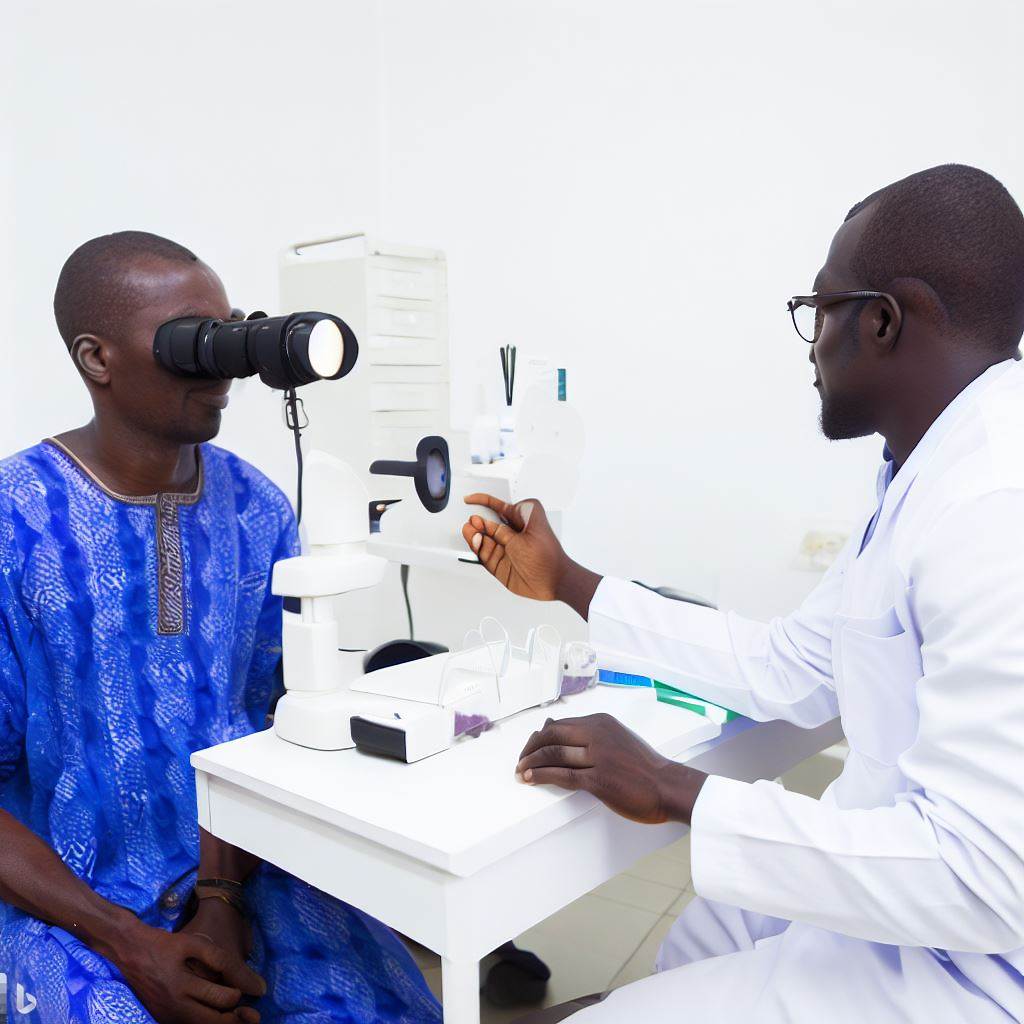Introduction
Optometry, a branch of healthcare that specializes in vision and eye care, is a growing field in Nigeria. Optometrists are essential in diagnosing and treating various eye conditions and refractive errors.
However, it is crucial for these professionals to understand the different specialty areas within optometry to provide comprehensive care.
By exploring the specialty areas in optometry in Nigeria, optometrists can enhance their skills and knowledge in specific areas such as contact lenses, pediatric optometry, low vision, and ocular diseases. This allows them to cater to the unique needs of different patient populations.
Understanding the importance of these specialty areas is vital for optometrists as it enables them to deliver specialized services effectively. For instance, by gaining expertise in contact lenses, optometrists can help patients with corneal abnormalities or those seeking alternatives to eyeglasses.
Moreover, specialized knowledge in pediatric optometry equips optometrists to detect and manage eye conditions in children from an early age, preventing long-term vision problems.
Similarly, expertise in low vision aids in enhancing the quality of life for individuals with significant visual impairments.
Furthermore, optometrists specializing in ocular diseases play a crucial role in diagnosing and managing conditions such as glaucoma, diabetic retinopathy, and macular degeneration. Timely intervention can help prevent vision loss and improve patient outcomes.
Exploring the specialty areas in optometry in Nigeria is essential for optometrists to provide comprehensive eye care. Basically, by understanding and acquiring expertise in these areas, optometrists can better serve their patients’ needs, ensuring optimal visual health and well-being.
Definition of Optometry
Optometry is a specialized healthcare field dedicated to eye care and vision enhancement, with a vital role in diagnosing and managing various eye conditions.
Through advanced techniques and equipment, optometrists assess and treat visual issues, screening for eye diseases and referring patients to ophthalmologists when necessary.
In Nigeria, optometrists have a broad scope of practice, covering clinical optometry, contact lenses, low vision services, and pediatric optometry.
Clinical optometry involves providing primary eye care, including prescribing glasses and medication for common eye problems. Optometrists are adept at detecting and managing conditions like cataracts, glaucoma, and diabetic retinopathy through comprehensive eye examinations.
Contact lens fitting is another area of specialization within optometry, where optometrists assess corneal shape and size to determine the most suitable lenses and educate patients about proper lens hygiene to prevent eye infections.
Low vision services aim to maximize remaining vision for individuals with visual impairments, utilizing various visual aids and devices to enhance their quality of life.
Scope of practice for optometrists in Nigeria
Pediatric optometry focuses on eye care for children, conducting comprehensive eye examinations to identify and manage vision problems in young patients.
Optometrists can prescribe glasses or visual aids to correct refractive errors in children. Nigerian optometrists contribute to the advancement of the field through research and academic activities, developing new techniques, treatments, and devices for vision improvement.
Overall, optometry’s critical role in eye care encompasses diagnostic, therapeutic, and preventive aspects.
In Nigeria, optometrists have a wide scope of practice, offering services such as clinical optometry, contact lens fitting, low vision services, and pediatric optometry, thus ensuring essential eye health services for individuals in the country.
Read: Occupational Therapy Schools: Where to Study in Nigeria
General Overview of Optometry in Nigeria
Optometry in Nigeria is an expanding field that addresses crucial eye care needs. Recognized as a growing healthcare profession, optometrists, or eye doctors, are instrumental in promoting good eye health and preventing vision issues.
The country’s large population experiences common eye health challenges, such as refractive errors (nearsightedness, farsightedness) and conditions like cataracts, glaucoma, and diabetic retinopathy.
The demand for optometry services in Nigeria has led to a rise in individuals pursuing this career path. Various optometry schools now offer comprehensive training, combining theoretical knowledge with practical skills.
The Nigerian Optometric Association (NOA) plays a vital role in advancing the field, working to improve eye care standards, protect optometrists’ rights, and provide continuous education.
Optometrists work in private practices, clinics, hospitals, and optical stores, collaborating with ophthalmologists and other healthcare professionals to offer comprehensive eye care services. They conduct thorough eye examinations, prescribe corrective lenses, and provide vision therapy.
Specialty areas in optometry in Nigeria encompass pediatric optometry, geriatric optometry, contact lens fitting, low vision rehabilitation, and ocular disease management. These specialties cater to specific needs across different age groups and health conditions.
As the demand for eye care grows, optometry in Nigeria is expected to flourish further in the coming years. The profession’s recognition, the establishment of optometry schools, and the dedication of the Nigerian Optometric Association ensure that the population receives essential eye care services.
Read: Step-by-step Guide to Becoming a Nursing Assistant in Nigeria
Specialty Areas in Optometry
Specialty areas in optometry can provide a more focused and in-depth approach for eye care. In Nigeria, optometrists have various options to specialize in, catering to specific eye conditions and patient needs.
These specialty areas require specific skills and expertise. Let’s explore some of these specialty areas in optometry in Nigeria:
- Pediatric Optometry: Specializing in children’s eye care, pediatric optometrists diagnose and manage visual problems in infants, toddlers, and teenagers.
- Contact Lens Optometry: A crucial field in optometry, contact lens specialists fit patients with suitable contact lenses. They examine the eye surface and its curvature to ensure a comfortable and accurate contact lens prescription.
- Low Vision Rehabilitation: Optometrists specializing in low vision help patients with severe visual impairments maximize their remaining sight.
- Geriatric Optometry: Focusing on eye care for the elderly, geriatric optometrists address age-related vision problems, such as cataracts, glaucoma, and macular degeneration. They provide appropriate interventions and collaborate with other healthcare professionals to manage coexisting conditions.
- Binocular Vision and Vision Therapy: Optometrists specializing in binocular vision assess and treat patients with eye alignment and coordination issues.
- Ocular Disease Management: These optometrists diagnose and manage various eye diseases, including diabetic retinopathy, glaucoma, and macular degeneration.
- Sports Vision: Specialists in sports vision enhance athletes’ visual skills to improve their performance. They assess visual acuity, depth perception, and eye-hand coordination, prescribing interventions like specialized contact lenses or vision training programs.
- Occupational Optometry: Optometrists in this field focus on optimizing visual performance for specific occupations. They assess and address eye-related challenges faced by individuals in jobs requiring high visual demands, such as pilots or computer workers.
- Neuro-Optometry: These optometrists specialize in assessing and managing visual problems associated with neurological conditions like stroke, traumatic brain injury, or multiple sclerosis.
Specific focus and skills required for each specialty area
Each specialty area in optometry requires specific focus and skills. First and foremost, pediatric optometrists need patience, excellent communication skills, and a deep understanding of child development.
On the other hand, contact lens optometrists must be skilled in fitting various types of contacts and regularly updating their knowledge on lens materials and technologies.
Meanwhile, low vision specialists should have empathy, problem-solving abilities, and creativity in designing suitable visual aids.
Similarly, geriatric optometrists require expertise in managing age-related eye conditions and collaborating with other healthcare professionals.
Furthermore, binocular vision specialists need to be skilled in assessing eye movement disorders and prescribing appropriate vision therapy exercises.
In addition, ocular disease management optometrists need advanced diagnostic skills, a strong knowledge of various eye diseases, and a proactive approach to disease management.
Moreover, sports vision optometrists must have a deep understanding of sports-related visual demands and be skilled in prescribing interventions to enhance athletes’ visual skills.
Neuro-optometrists require expertise in assessing visual problems associated with neurological conditions and integrating rehabilitative strategies into overall patient care.
Overall, each specialty area in optometry demands specific expertise and skills to cater to the diverse needs of patients in Nigeria.
Read: Continuing Education Opportunities for Nigerian Optometrists

Pediatric Optometry
Detecting and Managing Eye Problems in Children
Pediatric optometry is an essential area of specialization in Nigeria that focuses on the eye health of children.
Consequently, with the alarming rise in eye problems among Nigerian children, it is crucial to discuss the importance of pediatric optometry in detecting and managing these issues.
Therefore, this blog section aims to shed light on the challenges and opportunities in this specialty field.
Importance of Pediatric Optometry
- Early Detection of Eye Problems: Pediatric optometry plays a pivotal role in identifying eye problems at an early stage, allowing timely intervention and preventing further complications.
- Visual Development: Children’s vision undergoes crucial development during their early years. Pediatric optometrists ensure proper visual development through regular eye examinations and necessary interventions.
- Amblyopia Detection: Amblyopia, commonly known as lazy eye, can significantly impact a child’s vision if left untreated. Pediatric optometrists are trained to detect and manage this condition effectively.
- Correcting Refractive Errors: Pediatric optometrists prescribe and fit glasses or contact lenses when necessary, ensuring children have optimal visual clarity for learning and daily activities.
- Eye Health Education: Pediatric optometrists educate parents and caregivers on proper eye hygiene, nutrition, and preventive measures to maintain good eye health in children.
Challenges in Pediatric Optometry
- Limited Awareness: Lack of awareness among parents and healthcare professionals about the importance of pediatric optometry is a significant challenge.
- Accessibility and Affordability: Accessibility to pediatric optometry services, both in urban and rural areas, is limited, making it challenging for many children to receive proper eye care.
- Equipment and Technology: The availability of advanced diagnostic equipment and technology specific to pediatric optometry is limited in Nigeria, hindering comprehensive eye examinations.
- Child Cooperation: Children’s cooperative behavior during eye examinations can be challenging, often requiring a specialized approach and tools to obtain accurate results.
Opportunities in Pediatric Optometry
- Increased Awareness and Advocacy: By raising awareness through educational campaigns and advocacy programs, more parents and healthcare professionals can understand the importance of pediatric optometry.
- Collaborations with Pediatricians: Collaborations between pediatric optometrists and pediatricians can strengthen the delivery of comprehensive eye care to children.
- Training and Education: Investing in training and education programs for optometrists, specifically in pediatric optometry, can enhance the availability of specialized eye care for children.
- Public-Private Partnerships: Encouraging partnerships between government agencies, non-profit organizations, and private healthcare providers can help bridge the gap in access to pediatric optometry services.
- Research and Innovation: Promoting research in pediatric optometry can lead to the development of new diagnostic tools, treatment methods, and interventions tailored to children’s specific needs.
In short, pediatric optometry plays a vital role in detecting and managing eye problems in children. Despite the challenges faced, there are ample opportunities to improve access, awareness, and quality of pediatric optometry services in Nigeria.
By prioritizing children’s eye health, we can ensure a brighter future for the next generation.
Read: How to Become a Medical Lab Technician in Nigeria
Low Vision Rehabilitation
Low Vision Rehabilitation: Improving the Quality of Life for Visually Impaired Individuals
Specialty Areas in Optometry in Nigeria include low vision rehabilitation, which plays a crucial role in enhancing the quality of life for visually impaired individuals.
This field focuses on maximizing visual function and independence for those with permanent vision loss that cannot be corrected by standard eyeglasses, contact lenses, or medical or surgical interventions.
The primary goal of low vision rehabilitation is to optimize residual vision and teach patients how to make the most out of their remaining visual abilities.
This involves comprehensive assessments of visual function, including acuity, visual field, contrast sensitivity, and color vision, to determine specific visual needs and limitations.
A key aspect of low-vision rehabilitation is the provision of low-vision aids and devices, ranging from simple magnifiers to sophisticated electronic devices. These tools enable visually impaired individuals to improve their ability to perform daily tasks like reading, writing, cooking, and navigation.
Vision therapy and training are also integral to low vision rehabilitation. They aim to enhance visual skills and compensate for visual deficits.
Techniques like scanning, eccentric viewing, and fixation can help individuals make better use of their remaining vision.
Training in activities of daily living and mobility can further aid in regaining independence and navigating surroundings safely.
Despite its importance, low vision rehabilitation in Nigeria faces challenges due to limited specialized services, lack of awareness, and scarcity of aids and devices.
Addressing these issues requires increased awareness, incorporation of low-vision training in optometry curricula, and collaboration with international organizations for aid distribution.
Therefore, low vision rehabilitation is a vital specialty area in optometry in Nigeria. By providing assessments, aids, therapies, and training, it aims to maximize vision and enhance independence for visually impaired individuals.
Read: Tips for Starting Your Own Optometry Practice in Nigeria
Ocular Disease Management
Ocular disease management is a crucial specialty area in optometry, focusing on the detection, diagnosis, and treatment of various eye conditions.
Optometrists specializing in ocular disease management play a vital role in preserving and improving the eye health of individuals in Nigeria.
Common Ocular Diseases in Nigeria
Nigeria, like many other countries, faces a significant burden of ocular diseases. Early detection and timely intervention are essential in managing these conditions and preventing potential vision loss.
Here are some of the common ocular diseases observed in Nigeria:
- Glaucoma: Glaucoma is a chronic and progressive eye disease characterized by increased intraocular pressure, which damages the optic nerve. It is a leading cause of blindness in Nigeria.
- Cataracts: Cataracts are a common age-related eye condition that causes clouding of the eye’s natural lens, leading to blurred vision. Cataracts affect a large population in Nigeria, particularly the elderly.
- Diabetic Retinopathy: Diabetes has become an epidemic in Nigeria, and one of its potential complications is diabetic retinopathy. This condition affects the blood vessels in the retina and can result in vision loss if left untreated.
- Age-related Macular Degeneration (AMD): AMD is a progressive eye disease that affects the central part of the retina, called the macula. It is a leading cause of irreversible vision loss among the elderly in Nigeria.
- Conjunctivitis: Also known as “pink eye,” conjunctivitis is an inflammation of the conjunctiva, the clear membrane covering the white part of the eye. It can be caused by bacteria, viruses, allergens, or irritants.
Importance of Early Detection and Intervention
Early detection and intervention are paramount in managing ocular diseases and preventing their progression.
Optometrists specializing in ocular disease management are equipped with the knowledge and skills to identify these conditions at their earliest stages.
By conducting comprehensive eye examinations and using advanced diagnostic tools, they can detect subtle signs of ocular diseases that might otherwise go unnoticed.
Early intervention can significantly improve treatment outcomes and minimize the risk of vision loss. Optometrists can prescribe appropriate medications, offer lifestyle recommendations, and refer patients to ophthalmologists or other specialists when necessary.
Additionally, patient education plays a crucial role in managing ocular diseases. Optometrists can educate individuals about the importance of regular eye examinations, the early signs and symptoms of ocular diseases, and the need for timely treatment.
Collaborative efforts between optometrists, ophthalmologists, and other healthcare professionals are essential for comprehensive ocular disease management in Nigeria.
By working together, healthcare providers can ensure timely and coordinated care, leading to better outcomes for patients.
In review, the specialty area of managing ocular diseases in optometry is of utmost importance in Nigeria.
Optometrists specializing in ocular disease management play a vital role in early detection, diagnosis, and treatment of common ocular diseases such as glaucoma, cataracts, diabetic retinopathy, AMD, and conjunctivitis.
Through their expertise and collaboration with other healthcare professionals, optometrists help preserve and improve the eye health of Nigerians, ultimately preventing unnecessary vision loss.
Read: Overview of Medical Laboratory Technician Profession in Nigeria
Contact lens specializations
Contact lens specializations in optometry refer to specialized areas of expertise within the field of contact lens fitting and management.
These subspecialties allow optometrists to develop specific skills and knowledge needed to address various vision and eye health needs of patients who prefer or require contact lenses as a vision correction option.
Different contact lens specializations in optometry
Here are some of the different contact lens specializations in optometry:
- Orthokeratology (Ortho-K): This specialization involves the use of specially designed rigid gas-permeable contact lenses that reshape the cornea overnight, providing clear vision during the day without the need for glasses or contact lenses.
It is mainly used for myopia control in children and adults. - Pediatric contact lenses: Optometrists specializing in pediatric contact lenses focus on fitting contact lenses in children with conditions like high refractive errors, astigmatism, or corneal irregularities. They provide individualized care and management for young patients.
- Multifocal contact lenses: These lenses are designed to correct multiple vision problems, such as presbyopia, where people struggle with near vision as they age. Optometrists specializing in multifocal contact lenses help patients achieve clear vision at all distances.
- Scleral lenses: Scleral lenses are large diameter contact lenses that vault over the cornea and rest on the white part of the eye (sclera). They are used for patients with irregular corneas, such as those with keratoconus or corneal scarring.
- Myopia control contact lenses: Optometrists who specialize in myopia control contact lenses focus on managing and slowing down the progression of myopia (nearsightedness) in children. Methods include soft multifocal lenses or orthokeratology.
- Specialty lenses for irregular corneas: For patients with irregular corneas due to conditions like keratoconus, post-surgical complications, or corneal transplant, optometrists specializing in specialty lenses help fit and manage custom-designed lenses.
- Sports vision lenses: Optometrists with expertise in sports vision provide contact lens solutions for athletes, considering factors such as impact resistance, enhanced peripheral vision, and comfort during physical activities.
Read: Top Institutions to Study Phlebotomy in Nigeria
Challenges and opportunities in the contact lens specialty area in Nigeria
Examining the challenges and opportunities in the contact lens specialty area in Nigeria, we must consider the unique context of the country’s healthcare system. Challenges in this specialty area include:
- Limited access to specialized lenses: The availability of contact lens options may be limited in certain regions, making it challenging for optometrists to provide the best options for their patients.
- Lack of awareness and education: Many Nigerians may not be aware of the benefits and potential of contact lenses. Educating the public and promoting awareness is crucial for growth in this specialty area.
- Infrastructure and technology: Limited access to advanced diagnostic equipment and sophisticated lens technologies can impede the potential for advancements in contact lens specialization.
Despite these challenges, there are several opportunities in the contact lens specialty area in Nigeria:
- Growing demand for vision correction: With a large population and increasing awareness of eye health, there is a growing demand for contact lenses as an alternative vision correction option.
- Collaboration with industry partners: Collaboration with contact lens manufacturers and distributors can help improve the availability of specialized lenses and foster advancements in the field.
- Research and innovation: By encouraging research and innovation, Nigerian optometrists can contribute to the development of new contact lens designs and solutions tailored to the specific needs of their patients.
- Training and professional development: Investing in continuous professional development programs and training opportunities can enhance the skills and expertise of optometrists in the contact lens specialty area.
As the field continues to advance, optometrists in Nigeria can play a significant role in providing improved vision care through contact lenses.
Read: The Role of Pediatricians in Nigeria’s Healthcare System
Conclusion
In summary, understanding the specialty areas in optometry in Nigeria is crucial for several reasons. Firstly, it allows eye care professionals to provide more specialized and effective treatment to patients.
Secondly, it opens up new career opportunities and avenues for optometry students and professionals. By exploring these specialty areas, optometry professionals can contribute to advancements in technology and research, ultimately improving the eye care landscape in Nigeria.
It is important for optometry students and professionals to consider these specialty areas and pursue further education and training in order to make a significant impact in the field.
With increased knowledge and expertise in these specialty areas, optometry professionals can better address the specific needs and challenges of patients in Nigeria.
Moreover, the potential impact of these specialty areas on the eye care landscape in Nigeria is immense and has the potential to revolutionize the industry.
Therefore, it is imperative that optometry students and professionals actively engage and explore these specialty areas to drive positive change and enhance the quality of eye care services in Nigeria.




